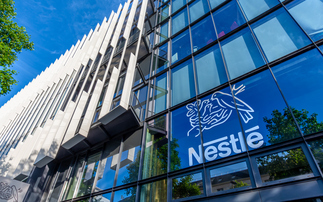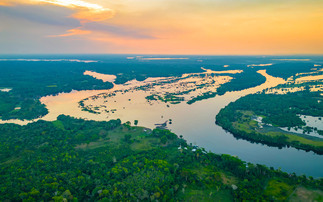The SDGs pledge to 'take urgent action to combat climate change and its impacts', but how will businesses respond?
Targets
13.1 Strengthen resilience and adaptive capacity to climate-related hazards and natural disasters in all countries.
13.2 Integrate climate change measures into national policies, strategies and planning.
13.3 Improve education, awareness-raising and human and institutional capacity on climate change mitigation, adaptation, impact reduction and early warning.
13.A Implement the commitment undertaken by developed-country parties to the United Nations Framework Convention on Climate Change to a goal of mobilizing jointly $100bn annually by 2020 from all sources to address the needs of developing countries in the context of meaningful mitigation actions and transparency on implementation and fully operationalize the Green Climate Fund through its capitalization as soon as possible.
13.B Promote mechanisms for raising capacity for effective climate change-related planning and management in least developed countries and small island developing States, including focusing on women, youth and local and marginalized communities. Acknowledging that the United Nations Framework Convention on Climate Change is the primary international, intergovernmental forum for negotiating the global response to climate change.
Progress to date
The UN's most recent progress report on SDG13 is bracingly concise and remarkably stark. "The year 2017 was one of the three warmest on record and was 1.1 degrees Celsius above the pre-industrial period," it states. "An analysis by the World Meteorological Organization shows that the five-year average global temperature from 2013 to 2017 was also the highest on record. The world continues to experience rising sea levels, extreme weather conditions (the North Atlantic hurricane season was the costliest ever recorded) and increasing concentrations of greenhouse gases."
At the same time it points to the encouraging progress made in support of the Paris Agreement on climate change, noting that as of April 9th 2018 175 Parties had ratified the Paris Agreement and 168 Parties (167 countries plus the European Commission) had communicated their first nationally determined contributions to the United Nations Framework Convention on Climate Change Secretariat.
More broadly, as of 2014-2015 most reporting countries indicated that environmental impact assessments, legislation on protected areas, climate change adaptation projects and programmes, and integrated planning played a major role in reducing underlying risk factors for their economy. Ten developing countries have now submitted their first official national climate adaptation plans under the Paris Agreement.
Meanwhile, developed countries continue to "make progress towards the goal of jointly mobilizing $100bn annually by 2020 to address the needs of developing countries in the context of meaningful mitigation actions".
However, those who follow global climate action closely are likely to conclude that the official UN progress report pulls its punches.
There is no mention of the fact global annual greenhouse gas emissions have plateaued since the Paris Agreement and are now climbing again, just as there is no mention of the fact overall clean energy investment appears to have stalled globally.
Equally, on-going concerns about the ability and willingness of industrialised nations to mobilise $100bn a year of climate finance each year from 2020 are glossed over, despite the high profile disagreements in recent months at the Green Climate Fund. Similar concerns about the strength of much-criticised efforts by the aviation and shipping sectors to tackle rising emissions are also ignored.
It is also notable that the most recent update came before the record-breaking northern hemisphere summer, which saw multiple temperature records toppled and food prices rise as extreme heat took its toll.
And then there is the elephant in the room, in the form of the Trump administration's stated desire to quit the Paris Agreement altogether and in so doing ditch the official climate action strategy of the world's second largest emitter.
The rapid growth of the renewables and electric vehicle market, coupled with the continued commitment to the Paris Agreement from all government's bar the US and mounting evidence from some industrialised economies that economic growth and deep cuts in carbon emissions are compatible all suggest encouraging progress is being made. But rising emissions and temperatures provide further proof a step change in the pace of decarbonisation is urgently required.
Business implications
The SDGs were unveiled in September 2015, three months before the brokering of the Paris Agreement in the French capital. As such the targets contained in SDG13 are both an encouraging forerunner to that historic treaty and a clear attempt not to step on its toes.
The targets indicate a willingness to deliver bold and wide-ranging climate action, but are relatively vague on precisely what that action should entail. For example, SDG13.1 states simply that governments should "strengthen resilience and adaptive capacity to climate-related hazards and natural disasters in all countries". Meanwhile, SDG13.2 pledges to "integrate climate change measures into national policies, strategies and planning".
As such, the SDGs are essentially a simplified version of the Paris Agreement, providing governments with the freedom to develop their own climate strategies, just without the Treaty's specific targets to keep temperature increases well below 2C and build a net zero emission economy this century.
That said, when taken in conjunction with the Paris Agreement SDG13 has enormous implications for businesses.
As has become increasingly clear a credible strategy to "combat climate change and its impacts" requires the wholesale transformation of the global economy and a rapid industrial green revolution that will result in the end of the fossil fuel era. Every single business will be affected by either the climate impacts that would result from the failure to deliver on SDG13 or the huge changes in technology, infrastructure, investment, and politics necessary to meet the goal.
Adaptation strategies will require long term planning and investment from businesses. Mitigation strategies will fuel the development of low carbon markets and create stranded asset risks for high carbon business models. And awareness-raising will help stimulate demand for clean technologies and amplify reputational risks for polluting industries. Meanwhile, the sub-targets commitment to help developing countries decarbonise and bolster climate resilience will be critical to the economic development of poorer nations and emerging economies.
Every business has a role to play in supporting SDG13, and those that seek to ignore it are likely to face growing economic, regulatory, and public pressure.
Business risks
The risks associated with SDG13 are some of the most extensively well documented in human history. A failure to adequately combat climate change and its impacts would eventually unleash runaway warming that many experts fear would pose an existential threat to the global economy. As last week's IPCC report on the risks associated with more than 1.5C of warming made clear, many scientists fear there are just a few decades left in which to avert worst case scenarios that could have catastrophic impacts on global food production, coastal cities, international security, biodiversity, and vast swathes of habitable land.
Businesses and countries that fail to invest in climate resilience risk facing escalating damage and disruption. Meanwhile fears remain that beyond a certain threshold the inter-related nature of climate impacts and their effects on food production and migration makes meaningful adaptation all but impossible. The global insurance industry remains understandably fearful that worst case climate scenarios for later this century where extreme weather and sea levels escalate rapidly could lead to the implosion of its business model.
However, efforts to tackle climate risks also present significant risks for businesses. The politicised nature of the debate over climate action creates inherent policy instability. At the same time the general direction of travel in favour of emissions reduction strategies suggests carbon intensive firms and industries will have to find ways to decarbonise quickly or risk being forced out of business. Stranded asset risks abound for investors and businesses that fail to respond to ambitious decarbonisation strategies. Meanwhile, a failure to adequately plan for how carbon intensive industries and economies could be hit by climate policies risks resulting in unemployment and soci-economic challenges.
Equally, all businesses are likely to face some short term costs and security risks as corporate leaders and governments seek to navigate a complicated industrial transition. Carbon taxes, increased R&D spend, clean energy subsidies, the need to provide climate finance to developing countries, and a raft of other policies could all push up costs in the short term for businesses and taxpayers.
In addition, growing public awareness of climate risks and the increasing popularity of clean technologies will present intensifying reputational risks for many industries.
Business opportunities
The businesses opportunities associated with successfully combating climate change range from the obvious benefits of having a stable and habitable biosphere in which to operate to the single largest investment opportunity in economic history.
The simultaneous development of credible national climate policies and strengthened climate resilience measures has the potential to drive trillions of dollars of infrastructure investment in the coming decades, creating economies of scale that lead to rapid reductions in the cost of emerging clean technologies.
Executed by governments around the world, such measures should create a level playing field for businesses and a clear investment signal to financiers and entrepreneurs. New markets should accelerate and emerge in renewables, green transport, and resource and energy efficiency, while multi-billion dollar R&D efforts should be targeted at hard to decarbonise sectors such as heavy industry, agriculture, aviation, and shipping. The resulting disruption and challenge to incumbents should spark huge commercial opportunities for those businesses that are most agile in the face of changing policies and consumer demands.
Rapid growth in the clean energy, smart grid, electric vehicle, and multiple other sectors should accelerate as technical viability and cost competitiveness becomes ever more obvious. Businesses and investors are set to funnel more capital towards low carbon projects and business models, as they seek to avoid 'carbon bubble' risks and the body of work showing corporate climate leaders deliver more attractive long term returns becomes ever more compelling. At the same time firms looking to compete for the attention of millennial customers and employees will find that credible climate policies are non-negotiable.
The promised $100bn of climate funding a year and accompanying 'capacity building' in developing economies should aid wider development and fuel growth in emerging economies, while also creating specific new opportunities for clean technologies and emissions trading schemes.
Many climate scientists and development economists fear there is no sustainable long term development path available without deep decarbonisation. As such, any and all long term business opportunities flow from the delivery of SDG13.










